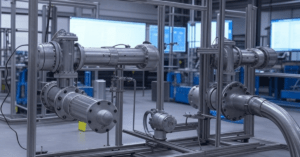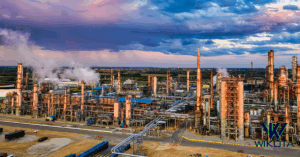In today’s rapidly evolving industrial landscape, the need for custom industrial fabrication has never been more critical. From specialized machinery and parts to large-scale structures, custom fabrication enables businesses to meet unique operational requirements that off-the-shelf solutions simply can’t address. By working closely with fabricators who understand specific needs, companies can streamline processes, increase efficiency, and ensure their equipment and structures are precisely suited to their tasks. In this blog post, we’ll explore the significance of custom industrial fabrication and highlight how tailored solutions can transform industrial operations.
Why Choose Custom Industrial Fabrication?
Every industry has unique demands, and while pre-made parts may meet basic requirements, they often fall short of optimizing performance. Custom industrial fabrication fills this gap by delivering bespoke solutions that address specific needs, including size, material, durability, and functionality. Here are some reasons why companies are turning to custom fabrication:
- Precision and Performance: Custom fabrication ensures that every part and component fits seamlessly within the existing setup. This precision minimizes issues, reduces wear and tear, and optimizes the performance of machinery and equipment.
- Enhanced Durability: Industrial environments are often harsh, with exposure to extreme temperatures, corrosive materials, or high-pressure conditions. Custom fabrication allows businesses to select materials and finishes that withstand these challenging environments, ensuring equipment lasts longer and requires less maintenance.
- Cost Efficiency: While custom fabrication may have a higher upfront cost than standard parts, it often proves more cost-effective in the long run. Tailored components reduce the likelihood of frequent repairs and replacements, saving time and resources.
- Improved Safety: Customized solutions can enhance safety by creating equipment and structures that comply precisely with industry standards and are designed to withstand specific pressures or loads, reducing the risk of accidents.
- Scalability and Flexibility: Custom fabrication allows for future scalability, meaning that businesses can expand their systems with compatible components as they grow, rather than facing compatibility issues with standard, one-size-fits-all parts.
Key Industries Benefiting from Custom Industrial Fabrication
Custom industrial fabrication serves a wide range of industries, each with distinct needs. Here are a few industries that significantly benefit from tailored solutions:
– Manufacturing: From conveyor systems to robotic arms, manufacturing often requires highly specialized machinery for efficient production. Custom fabrication provides tailored solutions that integrate seamlessly with existing production lines, enhancing productivity and reducing downtime.
– Oil and Gas: The oil and gas industry operates in some of the world’s harshest environments, requiring durable and corrosion-resistant components. Custom fabrication solutions ensure equipment longevity and safety, especially for pipelines, rigs, and refinery components.
– Construction: Custom industrial fabrication is invaluable in construction, providing unique structural elements that meet site-specific requirements. This can include custom-built scaffolding, load-bearing structures, and reinforced materials tailored to environmental conditions.
– Food Processing: Food-grade materials, such as stainless steel, are essential for fabricating safe and hygienic equipment in food processing. Custom solutions allow fabricators to create components that meet stringent sanitation standards and operate seamlessly within complex food production systems.
– Aerospace and Automotive: Precision is essential in the aerospace and automotive industries, where even minor deviations can have critical consequences. Custom fabrication ensures that every part meets exact specifications, contributing to the safety and performance of vehicles and aircraft.
Techniques in Custom Industrial Fabrication
The process of custom industrial fabrication involves several techniques that make it possible to create tailored solutions. Each technique offers unique benefits, and skilled fabricators use a combination of methods to deliver the ideal product. Here are some of the primary techniques in custom industrial fabrication:
- Cutting
Cutting is the initial step in fabrication, allowing raw materials to be sized to specifications. Methods like laser cutting, waterjet cutting, and plasma cutting offer high precision, even for thick materials. These techniques ensure that every piece is the exact size and shape needed for assembly, forming a solid foundation for further processing.
- Welding
Welding is a fundamental technique in custom fabrication, enabling the creation of robust joints between metal components. Skilled welders use techniques such as MIG, TIG, and stick welding based on material type, thickness, and the strength required for the final product. Quality welding ensures structural integrity and safety, especially in load-bearing components.
- Forming and Bending
Forming and bending give metal sheets and bars the desired shape without cutting or welding. Hydraulic press brakes and roll benders allow fabricators to create specific curves, angles, and shapes, essential for parts like frames, brackets, and enclosures.
- Machining
Machining involves using various tools, such as lathes, mills, and grinders, to shape materials to exact specifications. CNC (Computer Numerical Control) machining is widely used in custom fabrication for its high accuracy and ability to produce complex parts quickly and efficiently. Machining is crucial for creating custom components that require intricate details and precise tolerances.
- Surface Treatment and Finishing
Surface treatments, such as powder coating, anodizing, and galvanizing, are essential to protect fabricated parts from corrosion, wear, and environmental damage. A high-quality finish not only enhances durability but also adds aesthetic appeal, particularly for components visible to clients or the public.
The Custom Fabrication Process: From Concept to Completion
Every custom fabrication project begins with understanding the client’s requirements and objectives. Fabricators work closely with clients to develop detailed blueprints, taking into account dimensions, load requirements, environmental factors, and specific use cases. This collaborative approach ensures that the finished product meets all operational needs.
After the design phase, materials are selected, and fabrication begins using the techniques mentioned above. During production, quality control measures are in place to ensure each part meets the specified standards. Once complete, parts may undergo a trial assembly to verify fit and function before final delivery to the client.
The Future of Custom Industrial Fabrication
As industries continue to evolve, custom industrial fabrication is also advancing. Emerging technologies like 3D printing, automation, and AI are transforming the fabrication process, allowing for faster production, greater precision, and even more complex customizations. For instance, 3D printing allows fabricators to produce prototypes quickly, making it easier to refine designs before committing to full-scale production. Automation and AI can enhance accuracy and streamline workflows, making custom fabrication more accessible and cost-effective.
Conclusion
Custom industrial fabrication is essential for businesses that require equipment and structures tailored to their unique needs. By opting for custom solutions, companies can optimize performance, improve safety, and reduce long-term costs. With an array of advanced techniques—from cutting and welding to surface treatments—fabricators can deliver high-quality, durable products suited to specific applications across industries. As technology advances, custom industrial fabrication is poised to offer even more innovative, efficient solutions, helping businesses stay competitive in a fast-paced industrial environment.
Whether you’re in manufacturing, construction, or any other industry with unique operational demands, custom industrial fabrication can provide the solutions you need to meet today’s challenges and adapt to tomorrow’s opportunities. Reach out to a trusted fabricator to explore how customized components and structures can elevate your operations.
Ready to power your next project? Explore our
Fabrication Services, and let’s build something strong together.
Contact us today to learn how Wikota’s Fab Shop can help with your fabrication needs.
Serving North America – We ship completed projects anywhere in the US.




